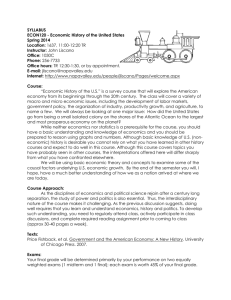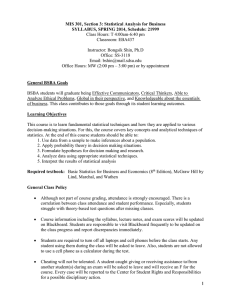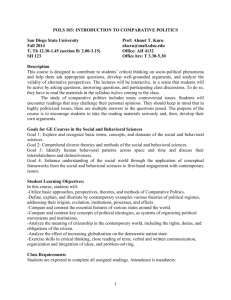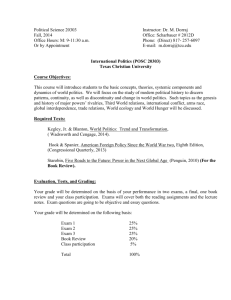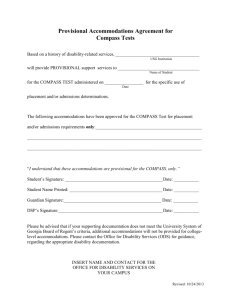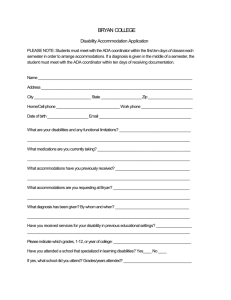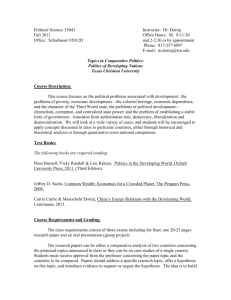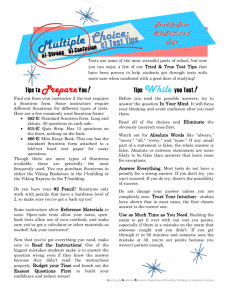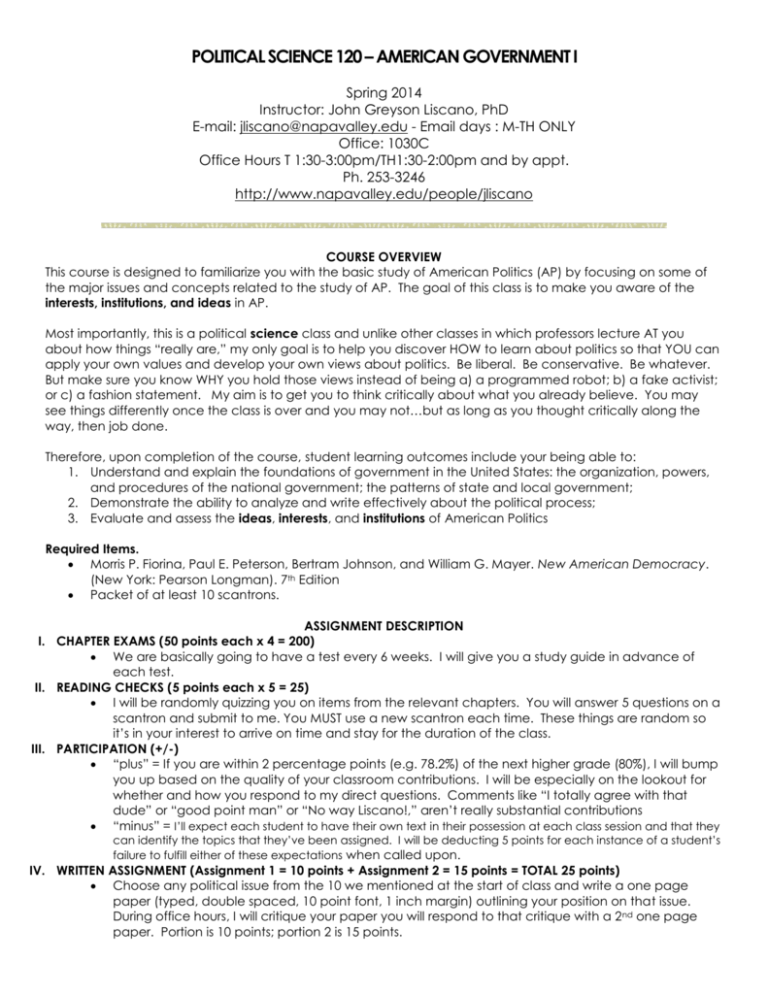
POLITICAL SCIENCE 120 – AMERICAN GOVERNMENT I
Spring 2014
Instructor: John Greyson Liscano, PhD
E-mail: jliscano@napavalley.edu - Email days : M-TH ONLY
Office: 1030C
Office Hours T 1:30-3:00pm/TH1:30-2:00pm and by appt.
Ph. 253-3246
http://www.napavalley.edu/people/jliscano
COURSE OVERVIEW
This course is designed to familiarize you with the basic study of American Politics (AP) by focusing on some of
the major issues and concepts related to the study of AP. The goal of this class is to make you aware of the
interests, institutions, and ideas in AP.
Most importantly, this is a political science class and unlike other classes in which professors lecture AT you
about how things “really are,” my only goal is to help you discover HOW to learn about politics so that YOU can
apply your own values and develop your own views about politics. Be liberal. Be conservative. Be whatever.
But make sure you know WHY you hold those views instead of being a) a programmed robot; b) a fake activist;
or c) a fashion statement. My aim is to get you to think critically about what you already believe. You may
see things differently once the class is over and you may not…but as long as you thought critically along the
way, then job done.
Therefore, upon completion of the course, student learning outcomes include your being able to:
1. Understand and explain the foundations of government in the United States: the organization, powers,
and procedures of the national government; the patterns of state and local government;
2. Demonstrate the ability to analyze and write effectively about the political process;
3. Evaluate and assess the ideas, interests, and institutions of American Politics
Required Items.
Morris P. Fiorina, Paul E. Peterson, Bertram Johnson, and William G. Mayer. New American Democracy.
(New York: Pearson Longman). 7th Edition
Packet of at least 10 scantrons.
ASSIGNMENT DESCRIPTION
I. CHAPTER EXAMS (50 points each x 4 = 200)
We are basically going to have a test every 6 weeks. I will give you a study guide in advance of
each test.
II. READING CHECKS (5 points each x 5 = 25)
I will be randomly quizzing you on items from the relevant chapters. You will answer 5 questions on a
scantron and submit to me. You MUST use a new scantron each time. These things are random so
it’s in your interest to arrive on time and stay for the duration of the class.
III. PARTICIPATION (+/-)
“plus” = If you are within 2 percentage points (e.g. 78.2%) of the next higher grade (80%), I will bump
you up based on the quality of your classroom contributions. I will be especially on the lookout for
whether and how you respond to my direct questions. Comments like “I totally agree with that
dude” or “good point man” or “No way Liscano!,” aren’t really substantial contributions
“minus” = I’ll expect each student to have their own text in their possession at each class session and that they
can identify the topics that they’ve been assigned. I will be deducting 5 points for each instance of a student’s
failure to fulfill either of these expectations when called upon.
IV. WRITTEN ASSIGNMENT (Assignment 1 = 10 points + Assignment 2 = 15 points = TOTAL 25 points)
Choose any political issue from the 10 we mentioned at the start of class and write a one page
paper (typed, double spaced, 10 point font, 1 inch margin) outlining your position on that issue.
During office hours, I will critique your paper you will respond to that critique with a 2 nd one page
paper. Portion is 10 points; portion 2 is 15 points.
OUTLINE
I.
II.
III.
IV.
V.
VI.
Introduction: Important items
Chapter 1: “Democracy in the United States”
Chapter 2: “The Colonial & Revolutionary Era” (p35-47)
Chapter 3” “Federalism”(p66-88)
TEST 1- 2/27
Chapter 5: “Public Opinion (p142-152)
Chapter 7: “Interest Groups”
Chapter 8: “Political Parties” (p220-231)
Chapter 9: “The Media” (p255-263)
Chapter 11: “Congress” (p314-315)
Chapter 14: “The Bureaucracy” (p396-399, 416)
Chapter 15: “The Courts” (p433-439, 451-455)
TEST 2 – 4/15
Chapter 16: “Civil Liberties” (p464-466, 472-478, 484-487)
Chapter 17: “Civil Rights” (p496-497, 501-502, 509-510, 514, 518)
Chapter 18: “Domestic Policy”
Chapter 19: “Economic Policy”
TEST 3 – 5/29 (9:00-10:00am)
Final Exam Due (5/29 9:00am)
Quizzes (5x5points)
Written Assignment (due 10/3)
50 points
50 points
50 points
50 points
25 points
25 points
250 points total
Your final grade will be computed on the following point scale:
A=225-250 points (90-100%)
B= 200-224 points (80-89%)
C=175-199 points (70-79%)
D=150-174 points (60-69%)
F =149 points & below (<59%)
Therefore, ending up with a 199 at the end of class is a C; 200 is a B. Similarly, 149 means you failed the
class and 150 means you didn’t. So keep in mind NOW that every point counts.
If at any point you would like to know your grade in the class simply add up all of your points to that
point and divide by the number of possible points to that point. Actual/Possible = %. Do not ask me to
calculate your grade as I will refer you back to this sentence: “please review syllabus.” Also, so-called “extra”
credit is not offered in this class.
Lastly, in my experience as a student, I always earned good grades when I focused on the subject
rather than when I focused on getting good grades. That’s my advice to you as well.
Also, keep in mind that I only read and respond to emails between Monday and Thursday.
Next, I’m a pretty easy going fellow so if tests or assignments don’t go your way please don’t come at me with
“it’s totally unfair Liscano,” or “that’s messed up Liscano;” Just be a level headed human being and I’ll be as
fair as I can with your circumstances. It goes without saying that I do not tolerate profanity or cell phones going
off, so again, just use your head.
Finally, for any questions, please just email directly and I’ll help you as quick as I can. Thanks everybody!!!
Disability Statement - Students in need of accommodations in the college learning environment:
Any student who feels s/he may need an accommodation based on the impact of a learning disability should contact Learning Services in the Library and Learning Resource Center
(LLRC), room 1766, phone (707) 256-7442. A Learning Disability Specialist will review your needs and determine appropriate accommodations.
If you need accommodations for physical or other types of disabilities, schedule an appointment with DSPS Counselor, Sheryl Fernandez, in the Counseling Department located on the
top floor of the 800 building, phone (707) 253-3040 for appointment.
All information and documentation is confidential.

